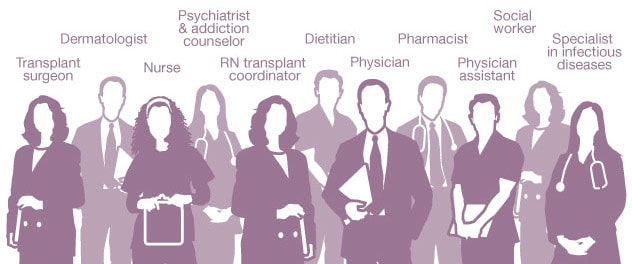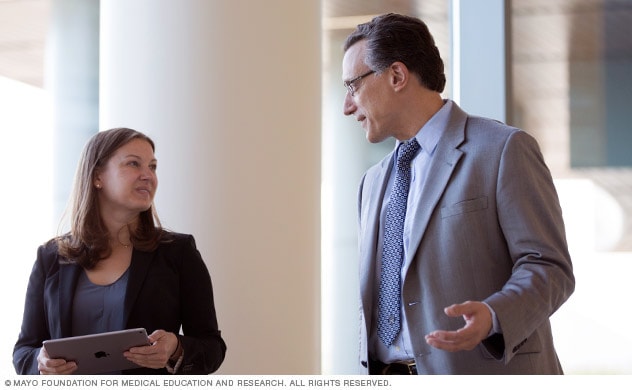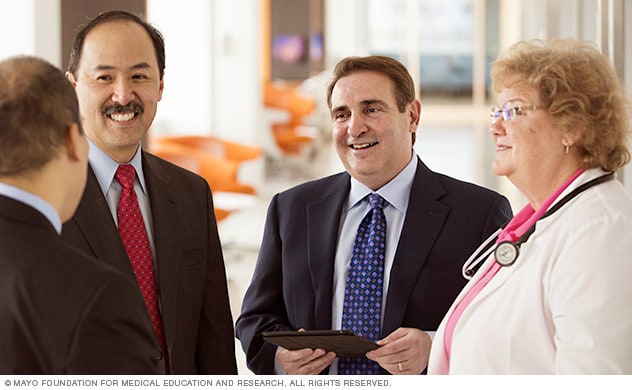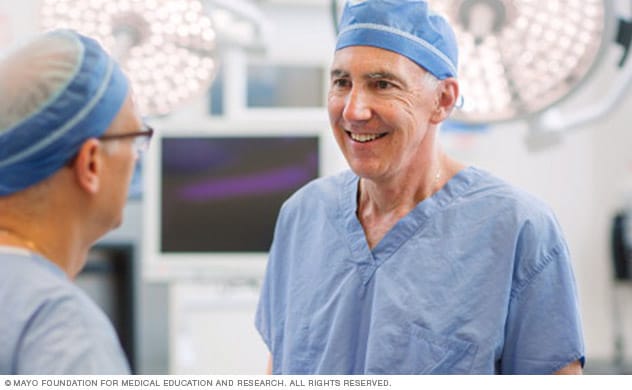Mayo Clinic's approach
 Mayo Clinic heart transplant team
Mayo Clinic heart transplant team
A team of doctors and other staff work together and discuss care for people who may need a heart transplant.
Multidisciplinary team approach
At Mayo Clinic, doctors trained in heart disease (cardiologists), heart and lung surgery (cardiac and thoracic surgeons), infectious disease management, mental health conditions (psychiatrists), and other specialties collaborate as a multidisciplinary team to provide you with coordinated, comprehensive care. Doctors work together with health care professionals in many areas to evaluate you, perform your heart transplant and coordinate follow-up care.
 Care team roles
Care team roles
Health care professionals trained in many medical specialties work together as a team to ensure favorable outcomes from your heart transplant.
Pediatric cardiologists, pediatric heart surgeons and other specialists work together to evaluate and treat children who may need heart transplants at Mayo Clinic's campus in Minnesota. At Mayo Clinic's campus in Arizona, cardiologists partner with Phoenix Children's Hospital to treat teenagers and young adults with congenital heart disease.
Multiorgan transplant experience
Mayo Clinic doctors and surgeons have experience evaluating and treating people with complex conditions who may need multiorgan transplants. Surgeons have experience performing multiorgan transplant procedures, and doctors trained in a wide array of specialties work together as a team in Mayo Clinic's Transplant Center to treat people who may need multiorgan transplants.
Amyloidosis expertise
Mayo doctors have extensive experience and expertise evaluating and treating people with amyloidosis.
Amyloidosis is a rare disease that occurs when an abnormal protein, called amyloid, builds up in multiple organs, including the heart, liver and kidneys, and can affect their function.
If amyloidosis has seriously affected your heart, you may be eligible for a heart transplant, or you may need a heart-liver transplant or a heart-kidney transplant. Your Mayo doctors and treatment team will evaluate your condition and determine if a heart transplant or other treatment may be most appropriate for your condition. Doctors at Mayo Clinic have experience treating amyloidosis with many treatments, including heart transplant for people who are eligible.
Individualized approach
Mayo Clinic doctors take the time to get to know you and work with you to provide exactly the care you need. Your doctors and transplant team will work with you and discuss your individual needs, desires and lifestyle to determine the most appropriate treatment for you.
Depending on your individual condition and needs, your doctors and transplant team may recommend a heart transplant or other therapies appropriate to your specific situation, such as a ventricular assist device.
 Mayo Clinic doctors collaborate to provide care
Mayo Clinic doctors collaborate to provide care
Mayo doctors collaborate as a team to care for people who may need a heart transplant.
Common recommendations and treatment at all Mayo Clinic locations
Mayo Clinic Transplant Center staff at campuses in Arizona, Florida and Minnesota work together to evaluate and treat people who may need heart transplants. Mayo Clinic offers common recommendations, evaluation processes, treatment, post-surgical care and follow-up care for heart transplant candidates at each of Mayo Clinic's campuses. Mayo Clinic staff coordinates care between the three sites as required.
You might be evaluated for a heart transplant at one Mayo Clinic location, but then have a heart transplant at another location if it's in your best interest. If you have your evaluation and transplant surgery at different locations, Mayo staff from both locations collaborates as a team to provide you with comprehensive care throughout the transplant process.
Research and innovation
Mayo Clinic researchers in the Transplant Center conduct ongoing studies and clinical trials in improving surgical procedures, improving outcomes and caring for people who need transplants. Researchers also study alternative therapies for people who might be able to use an alternative to a heart transplant. They also work on novel areas of research, such as exploring ways to personalize treatments for patients by using biomarkers and genetics to individualize therapy.
Mayo researchers in the Heart Transplant Research Program study challenges associated with heart transplantation and are working to understand the major causes of graft failure and find new ways to prolong survival.
The Mayo Clinic experience and patient stories
Our patients tell us that the quality of their interactions, our attention to detail and the efficiency of their visits mean health care like they've never experienced. See the stories of satisfied Mayo Clinic patients.
Expertise and rankings
 Mayo Clinic heart transplant team
Mayo Clinic heart transplant team
Doctors work together with doctors and staff in many specialties to provide heart transplant care.
Cardiovascular disease experience
Mayo Clinic cardiologists and cardiac and thoracic surgeons have extensive experience diagnosing and treating people with heart failure and other cardiovascular diseases. Doctors and surgeons care for more than 100,000 people who have cardiovascular disease each year. Mayo Clinic's campuses in Arizona, Florida and Minnesota each offer a Heart Failure Clinic staffed by a team of cardiologists and other specialists trained in evaluating and treating heart failure.
Surgical expertise
Mayo Clinic heart transplant surgeons have performed hundreds of procedures using state-of-the-art technology since the heart transplant program began in 1988.
Heart transplant outcomes compare favorably with the national average. Learn more about Mayo Clinic's heart transplant volumes and outcomes.
 Mayo Clinic heart surgeons
Mayo Clinic heart surgeons
Mayo Clinic heart surgeons work together to provide care for people who need heart transplants.
Heart transplant patient experience
Independent patient experience surveys indicate that a high number of Mayo Clinic patients who are being cared for by the heart transplant team are very satisfied with their care and would recommend the practice to others.
Nationally recognized expertise
Mayo Clinic in Rochester, Minnesota, Mayo Clinic in Phoenix/Scottsdale, Arizona, and Mayo Clinic in Jacksonville, Florida, are ranked among the Best Hospitals for heart and heart surgery by U.S. News & World Report. Mayo Clinic Children's Center in Rochester is ranked the No. 1 hospital in Minnesota, and the five-state region of Iowa, Minnesota, North Dakota, South Dakota and Wisconsin, according to U.S. News & World Report's 2024-2025 "Best Children's Hospitals" rankings.
With Mayo Clinic's emphasis on collaborative care, specialists at each of the campuses — Minnesota, Arizona and Florida — interact very closely with colleagues at the other campuses and the Mayo Clinic Health System.
Volumes and outcomes
Mayo Clinic doctors' experience and integrated team approach result in transplant outcomes that compare favorably with national averages. Teams work with transplant recipients before, during and after surgery to ensure the greatest likelihood of superior results.
Volumes and statistics are maintained separately for the three Mayo Clinic locations. Taken together or separately, transplant recipients at Mayo Clinic enjoy excellent results.
Learn more about Mayo Clinic's heart transplant volumes and outcomes.
Locations, travel and lodging
The Village at Mayo Clinic in Phoenix, Arizona, offers low-cost housing for transplant patients and their caregivers.
The Gabriel House of Care in Jacksonville, Florida, offers low-cost housing for transplant patients and their caregivers.
The Gift of Life Transplant House in Rochester, Minnesota, offers low-cost housing for transplant patients and their caregivers.
Mayo Clinic has major campuses in Phoenix and Scottsdale, Arizona; Jacksonville, Florida; and Rochester, Minnesota. The Mayo Clinic Health System has dozens of locations in several states.
For more information on visiting Mayo Clinic, choose your location below:
Costs and insurance
Mayo Clinic has dedicated transplant financial services representatives and social workers who can assist you with insurance and financial questions regarding your heart transplant.
Mayo Clinic works with hundreds of insurance companies and is an in-network provider for millions of people.
In most cases, Mayo Clinic doesn't require a physician referral. Some insurers require referrals or may have additional requirements for certain medical care. Many insurance companies require you to get preapproval authorization prior to transplant services.
Read more about heart transplant costs and insurance at Mayo Clinic.
Clinical trials
Explore Mayo Clinic studies of tests and procedures to help prevent, detect, treat or manage conditions.
Jan. 19, 2024